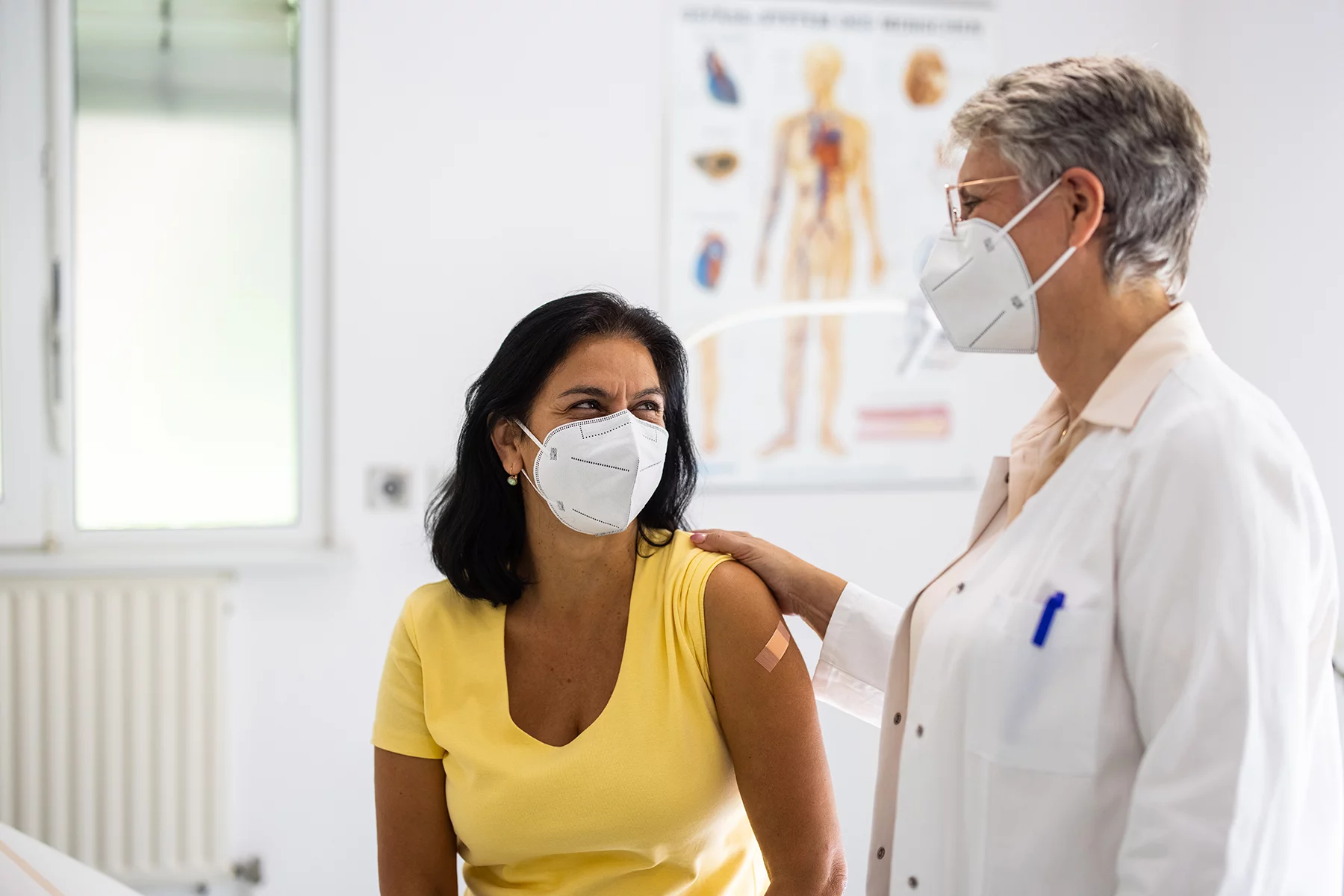The extensive healthcare infrastructure in Germany addresses nearly all health concerns that women face at any stage of their lives. Women using healthcare in Germany can access diagnoses, treatment, and care for most issues. These might include pregnancy care, cancer screenings, or having an abortion.
From finding a gynecologist to getting support during the menopause, you can find the answers to your women’s healthcare queries below:
- Women’s health in Germany
- Accessing women’s healthcare services in Germany
- Insurance for women’s healthcare in Germany
- Gynecologists in Germany
- Women’s contraception in Germany
- Maternity care services in Germany
- Breastfeeding in Germany
- Fertility treatments in Germany
- Abortion laws in Germany
- Menopause in Germany
- Cancer screenings in Germany
- Sexual health in Germany
- Availability and cost of feminine hygiene products
- Women’s clinics and health centers in Germany
- Women’s mental health services in Germany
- Services dealing with abuse and violence against women in Germany
- Useful resources
Allianz Care
Allianz Care is a world leader in providing international health insurance. Their various premiums provide professionally designed solutions for a variety of expat lifestyles. So, wherever your life takes you, make sure you have the right health protection for you and your family with Allianz Care.
Women’s health in Germany
On the whole, women’s healthcare in Germany is of a high standard. In addition, the Robert Koch institute found that two-thirds of German women considered their health to be good or very good (although men ranked theirs slightly higher). Since health insurance is mandatory in Germany, all women have access to gynecologists and other health professionals. There are 71,507 female-identifying doctors working in Germany as of 2021.
For the most part, women in Germany have excellent access to services ranging from pregnancy care to women’s cancer screenings. Life expectancy for women corresponds to the EU average, and the number of cardiovascular diseases has been decreasing in recent years. That said, there are still some barriers – for example, limited access to abortion. In addition, German health insurance usually does not fully cover most forms of birth control. And although most women claim to be in good health, chronic illnesses appear to be on the rise, and some groups of women report finding German healthcare less accessible. This is particularly the case for women with a migration background, those who attained a lower education level, and women with disabilities.
Accessing women’s healthcare services in Germany
Germany operates under a healthcare system funded by social security. By law, all German residents must have health insurance. Public insurance is more common, but you can also opt to be privately insured if you qualify.

If you’re a woman looking to access direct healthcare services in Germany, the first step is to make an appointment with a practitioner. Depending on the situation, that might be a Hausarzt (general practitioner) or a Frauenarzt (gynecologist). Women’s healthcare services are also available at non-profit organizations. One example is sexual health counseling at ProFamilia. In an emergency, hospitals in Germany are accessible 24/7.
Insurance for women’s healthcare in Germany
You’re legally required to have health insurance in Germany, whether it’s statutory cover or private. If you have German health insurance and are traveling outside of Germany but within the EU, the EHIC will also cover the basic costs of necessary health procedures or emergencies. Health insurers in Germany include:
Your insurance will cover most women’s health issues. These include:
- Vaccines recommended by the Robert Koch institute, including HPV
- Maternity benefit
- Certain cancer screenings
- Most of the costs associated with giving birth
If you have private insurance, it may cover some additional tests, screenings, or alternative medicine practitioners. Check with your insurer to find out exactly what they cover.
Gynecologists in Germany
German gynecologists are highly skilled, as they have to follow at least six years of medical training, followed by several years of specialized training in gynecology. Gynecologists can perform pap smears, women’s health exams, women’s cancer screenings, and mammograms. If you go through a pregnancy in Germany, you’ll see your gynecologist for several of the pregnancy exams and a postpartum checkup. Most gynecologists in Germany do not carry out the actual delivery of the baby, but there are some Beleg-Frauenärzte (in-house gynecologists) at certain German hospitals who deal with both pregnancy and delivery.
Most women in Germany stick with one gynecologist if they feel happy with her care. You can always switch doctors if you’re unhappy, but be aware you may have to pay a fee to change practices if it’s within the same quarter of the year.
You can find a gynecologist by searching online. Other options include getting recommendations from friends or your GP. If you are experiencing a gynecological emergency or a pregnancy complication out-of-hours, you should go to a local hospital. Almost all German gynecologists accept both public and private health insurance. However, some private gynecologists only accept private patients.
Women’s contraception in Germany
There are a wide variety of birth control options available in Germany, and many are easily accessible. Condoms, spermicides, and basal body temperature thermometers are sold at drugstores. None of these items need a prescription.
When it comes to prescription birth control, such as an IUD, arm implant, or the birth control pill, you’ll need to see a gynecologist. The gynecologist prescribe certain items like the birth control pill, which you’ll bring to your local pharmacy to fill.

For options such as the IUD, the gynecologist will schedule you an appointment for placement. Birth control costs range wildly depending on the procedure. You may pay as little as €5–10 for pills, but a full hysterectomy can cost several thousand euros.
Maternity care services in Germany
Germany offers excellent maternity healthcare services, including pregnancy checkups, birth assistance, or postpartum care. You’ll be entitled to see both a gynecologist and a midwife during your pregnancy. All prenatal exams are covered by German health insurance. While only a gynecologist can perform ultrasounds, your midwife is capable of most other pregnancy exams, if that’s what you’d prefer.
Women in Germany can opt to give birth at a hospital, birth center (Geburtshaus), or at home. For a birth center or homebirth, you’ll need to meet certain health criteria, so check with your healthcare practitioner. German health insurance covers at least a large chunk of these costs, as well as a postpartum midwife (Hebamme). A midwife can do home visits to check up on you and your baby. Your gynecologist will do a six-week postpartum checkup.
Breastfeeding in Germany
Thanks to generous maternity leave and the option to rent breast pumps covered by German health insurance, 40% of German mothers are still exclusively breastfeeding after six months postpartum. This is certainly a higher statistic than countries like the United States, where only 24.9 percent of mothers exclusively breastfeed after six months.
German hospitals typically offer new mothers help with breastfeeding after birth. Your postpartum midwife (Hebamme) can also help with breastfeeding issues. Independent lactation consultants in Germany can also assist with breastfeeding, though they charge out-of-pocket costs. Additionally, it is legal to breastfeed anywhere in public in Germany.
Fertility treatments in Germany
There are a wide variety of available fertility treatments for women in Germany. These include IUI (intra-uterine insemination), IVF (in-vitro fertilization), and medications to jump-start ovulation.
German public health insurance covers 50% of the costs for various fertility treatments, such as three cycles of IVF. However, this coverage comes with some strict requirements. For example, the woman receiving the procedure must be between 25 and 39 and be part of a married couple to qualify.

A few fertility treatments, such as Clomiphene tablets, are almost fully covered by German public insurance. Generally, you’ll only have to pay the pharmacy a small charge for the prescription. If you need thyroid pills or other medications for fertility treatments, check with your insurer, as they are often fully covered.
German private insurance often has different stipulations and coverage for fertility treatments. Always check with your provider before undergoing fertility treatments.
Abortion laws in Germany
Technically, it is illegal to have an abortion in Germany. However, the actual ramifications of this are complex, and the law generally allows for abortions in certain contexts. However, the procedure may only happen within the first 12 weeks of pregnancy. In theory, a woman receiving an abortion could be subject to legal prosecution in Germany, but in practice, this is extremely rare. However, a major barrier to getting an abortion in Germany is the relatively low pool of practitioners qualified to perform one. On both sides of the debate, there have been protests, and several organizations work to either make abortion fully legal or absolutely impossible.
Getting an abortion in Germany
Women looking to obtain a first-trimester abortion in Germany first need to do a consultation with a certified counselor, and the procedure must be performed by a qualified professional. There are several reasons why a woman may be allowed to have a termination. These include sexual assault, being a victim of incest, or on the grounds that the pregnancy could cause severe mental and physical harm to the woman. The first step for someone seeking an abortion is to talk to a gynecologist or a sexual health non-profit.
Before nine weeks, you will likely take a pill to end the pregnancy. If you have a termination at a later point, a doctor will carry out a surgical abortion. The cost is generally not covered by insurance, so you will need to pay upfront unless you can demonstrate a low income.
Menopause in Germany
If you think you may be at the beginning of menopause, your first person to consult in Germany will be your gynecologist. They can help confirm that you are entering menopause. If you experience menopausal difficulties, like hot flashes and vaginal dryness, your gynecologist can provide guidance and treatment. There are several treatments available, such as counseling, nutritional therapy, and hormone replacement therapy – check with your insurer to find out what is covered.
Cancer screenings in Germany
Women receive an annual cervical cancer screening in Germany starting at age 20. At age 35, women also receive an HPV test every three years with the pap smear. The Standing Committee on Vaccination (STIKO) also recommends that everyone get the HPV vaccine between nine and 14 years, regardless of gender.
When you’re 30 or older, you can opt for a yearly breast cancer palpation screening. Also, for women over 50, health insurance covers an annual mammogram. When it comes to less common forms of cancer, like ovarian cancer, your insurance may not always cover the costs of a screening.
Sexual health in Germany
Germany is well-equipped when it comes to helping women with their sexual health needs and concerns. Basic forms of birth control, such as condoms, are readily available in German drugstores. German drugstores also sell period products, such as tampons, pads, and menstrual cups. Gynecologists can prescribe other forms of birth control as well, but these are not usually covered by insurance. Various non-profits throughout the country provide free or low-cost counseling for women on topics such as safe sex, sexual abuse, and LGBTQ+ issues.
Availability and cost of feminine hygiene products
Since 2020, Germany no longer has a ‘luxury tax’ on feminine hygiene products such as tampons and disposable pads. In theory, they should be less expensive than in years prior, but costs can add up. Drugstores and Apotheken (pharmacies) throughout Germany stock disposable pads and tampons, and many drugstore chains also stock reusable options like cloth pads and menstrual cups. Reusable products like cloth pads, cups, and discs can save a lot of money and are easier on the environment. Feminine hygiene products in Germany are also readily available for online purchase.
Women’s clinics and health centers in Germany
For the most part, you’ll see your primary care physician or gynecologist for most health issues. Your doctor may refer you to a specialist at a women’s health center in certain situations. One example might be a clinic that specializes in women’s cancers.
There are also sexual health centers around Germany that you can utilize. Some services they offer include information on sexually-transmitted infections, screenings, and abortion counseling. If you’ve experienced sexual assault or rape, there are also crisis centers and free hotlines to call.
Women’s mental health services in Germany
If you’re dealing with depressive feelings or any other mental health issues, the first people to reach out to are your general practitioner or your gynecologist. Alternatively, you can contact a private therapist or a German non-profit that supports women’s mental health issues, such as Frauenberatung Ess Oh Ess.

There are also a number of organizations in Germany that help with specific women’s mental health services. The organization Schatten und Licht has helpful links to women suffering from postpartum mental health issues. BKID can help with counseling for infertility issues, and Frauen Gegen Gewalt provides counseling for women who have experienced sexual abuse.
Services dealing with eating disorders in Germany
Eating disorders primarily affect women. Germany offers several resources for anyone dealing with this difficult issue. The BZGA has a comprehensive website where you can call for help, search for in-person counseling, or sign up for online counseling.
There are other German non-profit organizations that can help you with eating disorders, such as ANAD and Cinderella. If you are already seeing a therapist, they might also be able to provide advice or refer you to a specialist. Your gynecologist or primary care doctor may also be able to provide you with additional resources for help.
Services dealing with abuse and violence against women in Germany
Sexual assault and violence in Germany are illegal, so any victim of sexual assault may file a criminal complaint. Victims can also file for victim compensation. If you’ve experienced sexual violence, you can call the free Hilfetelefon. Experienced counselors can provide help in English, as well as a number of other languages. Many non-profit organizations in Germany can provide counseling for victims of sexual abuse or assault. Some examples of these organizations include Frauen gegen Gewalt and Terre des Femmes.
Useful resources
- bff (Frauen gegen Gewalt) – an online service signposting help relating to violence against women
- Frauengesundheitsportal – a one-spot information hub for anything relating to women’s health in Germany
- ProFamilia – free counseling about birth control, sexual health, and other women’s health issues
- Liebesleben – additional counseling services regarding sexual health and sexual orientation
- Arbeitskreis Frauengesundheit – information hub with comprehensive links to women’s health, sexuality, and cancer resources all over Germany
- MotherHood e.V. – non-profit working for women’s rights during pregnancy, birth, and postpartum
- Endometriose Verein – non-profit dedicated to helping women with endometriosis






